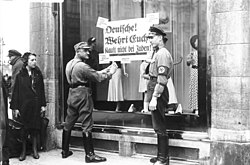
Back مقاطعة النازية للأعمال اليهودية Arabic Judenboykott German Boicot nazi de negocios judíos Spanish تحریم کسبوکارهای یهودی در آلمان نازی Persian Boycott antisémite de 1933 en Allemagne French חרם אחד באפריל 1933 HE Pemboikotan Nazi terhadap bisnis Yahudi ID Boicottaggio nazista del commercio ebraico Italian Bojkot antyżydowski w Niemczech (1933) Polish Nazistiska bojkotten av judiska företag Swedish
| Part of Nazi Germany's anti-Jewish actions, including Anti-Jewish legislation in pre-war Nazi Germany, Racial policy of Nazi Germany, Nuremberg Laws, Kristallnacht, and the Holocaust, and of the Aftermath of Political violence in Germany (1918–1933). | |
 Nazi SA paramilitaries outside Israel's Department Store in Berlin. The signs read: "Germans! Defend yourselves! Don't buy from Jews." | |
| Date | April 1, 1933 |
|---|---|
| Location | Pre-war Nazi Germany |
| Target | Jewish businesses and professionals |
| Participants | Nazi Party |

The Nazi boycott of Jewish businesses (German: Judenboykott) in Germany began on April 1, 1933, and was claimed to be a defensive reaction to the anti-Nazi boycott,[1][2] which had been initiated in March 1933.[3] It was largely unsuccessful, as the German population continued to use Jewish businesses, but revealed the intent of the Nazis to undermine the viability of Jews in Germany.[4]
It was an early governmental action against the Jews of Germany by the new National Socialist government, which culminated in the "Final Solution". It was a state-managed campaign of ever-increasing harassment, arrests, systematic pillaging, forced transfer of ownership to Nazi Party activists (managed by the Chamber of Commerce), and ultimately murder of Jewish business owners. In Berlin alone, there were 50,000 Jewish-owned businesses.[5]
- ^ Cite error: The named reference
USHMM_HE_boycottwas invoked but never defined (see the help page). - ^ The History Place (2 July 2016), “Triumph of Hitler: Nazis Boycott Jewish Shops”
- ^ Berel Lang (2009). Philosophical Witnessing: The Holocaust as Presence. UPNE. pp. 131–. ISBN 978-1-58465-741-5.
- ^ Pauley, Bruce F (1998), From Prejudice to Persecution: A History of Austrian Anti-Semitism, University of North Carolina Press, pp. 200–203
- ^ Cite error: The named reference
Kreutzmüller_2013was invoked but never defined (see the help page).